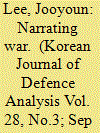| Srl | Item |
| 1 |
ID:
138752


|
|
|
|
|
| Summary/Abstract |
This article explores how the Abe administration might go about improving Japan's relationship with the South Korean government of President Park Geun-hye. Although bilateral ties are strained by disagreements over history, territory, and the “comfort women” issue, as well as mutual mistrust and “fatigue,” the paper argues that the two sides actually share substantial interests in common and urges Japanese leaders not to lose hope but to continue working hard to improve relations. It lays out a menu of policy “options” across political-diplomatic; security; economic; educational and socio-cultural; and environmental and scientific domains, and describes a strategy for how to build a better relationship over the next several years.
|
|
|
|
|
|
|
|
|
|
|
|
|
|
|
|
| 2 |
ID:
147393


|
|
|
|
|
| Summary/Abstract |
Since the 2000s Japan’s defense and security policy has undergone a historic shift, including a series of military expansions, the government’s 2014 approval of a reinterpretation of Article 9 of the postwar Constitution, and the Diet’s passage of security bills in 2015. This poses a question regarding how it was possible for all these changes to occur, if the long-held domestic norm of antimilitarism had persisted. This article examines Japan’s domestic normative context between 2001 and 2013 by analyzing the discursive constructions of Japanese war memory by editorials of two representative newspapers, Yomiuri Shimbun and Asahi Shimbun. It is found that Yomiuri supports the shift for military expansions as compatible with the postwar stance of a pacifist nation with the interpretation that the Japanese war contributed to independence movements in Asia. This is contrasted with Asahi, which opposes the change with a view that Japan’s war was an aggression. This article argues that the emerging discursive practices represented by Yomiuri produced the normative context that appealed to the distinctive target audience in such a way to operate as a precondition for the Japanese government to shift its defense and security policy. This raises the importance of the domestic factor in understanding Japan’s momentous changes in security, adding more nuances to the conventional focus on external factors.
|
|
|
|
|
|
|
|
|
|
|
|
|
|
|
|